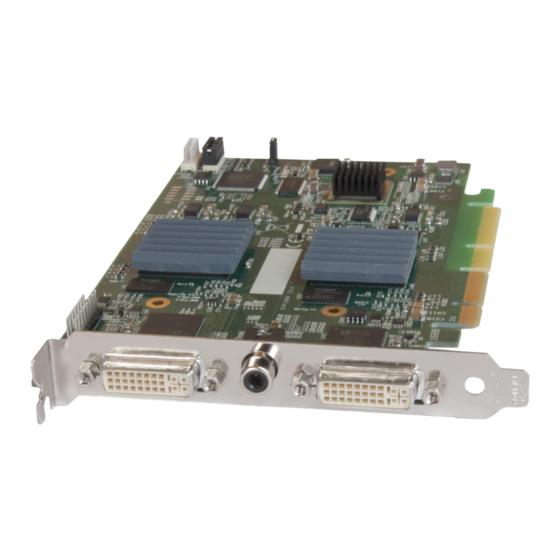Datapath VisionAV-HDAudio/Video Capture Card 사용자 설명서 - 페이지 11
{카테고리_이름} Datapath VisionAV-HDAudio/Video Capture Card에 대한 사용자 설명서을 온라인으로 검색하거나 PDF를 다운로드하세요. Datapath VisionAV-HDAudio/Video Capture Card 15 페이지.

Application Overview
The application displays the connected source in a window; it has the following features:
• Scales the data to fit in the window
• Ability to set up sources accurately (settings automatically saved)
• Save a single frame to a file in one of the following formats:
BMP, JPEG, GIF, TIFF, PNG
• Print a single frame
• Maintain the aspect ratio of the displayed captured data
• Cropping
• Display text over the data (on-screen display)
• Command line interface
• Help file documenting all features
Note:
The supplied drivers and software require that you are using:
• Windows® XP, Windows® Vista, Windows® Server 2003, Windows® Server 2008, Windows® 7 (x86
and x64 Operating Systems), Windows® 8 or Linux (audio not supported)
• CD / DVD ROM Drive
Using the card with other Datapath products
The VisionAV-HD captures data and stores it in an on-board video buffer. This data is then copied using
DMA to the host system for display, storage or streaming.
When a Datapath graphics card is used, VisionAV-HD transfers the data directly to the graphics card there-
by increasing performance. The VisionAV-HD sends the relevant portions of each captured image to each
display channel and instructs each channel to use its graphics engine to render the data. This fully utilises
the hardware and dramatically increases performance.
When a Direct3D compatible graphics card is used the data can be transferred direct to the graphics card
in a similar manner to the Datapath graphics card with the same benefit of non-tearing captures.
When the data is displayed on a non Datapath graphics card, the VisionAV-HD sends the data to system
memory or direct to the graphics card, dependant on the software used for display.
10
